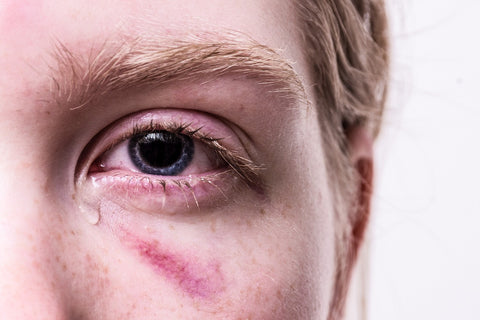- Home
- Shop
- Living
- Blog
- MIKOLITE
- SinterTech
- About
- Gallery
- Sign in
-
United States (USD $)
April 12, 2024
Injuries are an inevitable part of life, ranging from minor accidents to more severe traumas, each leaving a unique imprint on physical, emotional, and social well-being. While the immediate focus often revolves around physical recovery, the influence of injuries extends far beyond the surface, affecting various aspects of life. Understanding the holistic impact of injuries is crucial for effective management and comprehensive healing. This article explores six ways injuries influence overall health and wellness, from the physical toll to legal considerations and the importance of support systems.

When an injury occurs, the immediate focus is often on addressing the physical damage. Whether it's a sprained ankle, a broken bone, or a muscle tear, the body undergoes a period of healing and rehabilitation. However, even after the physical symptoms have subsided, the effects can linger. Chronic pain, reduced mobility, and decreased function in the injured area are common consequences. These physical limitations can impede daily activities, affect performance in work or recreational pursuits, and lead to frustration and feelings of inadequacy. Moreover, compensating for the injured body part can place strain on other muscles and joints, potentially leading to secondary injuries or long-term issues if not addressed promptly. Thus, prioritizing proper rehabilitation and ongoing physical therapy is essential to minimize the long-term impact of injuries on physical health.
Beyond the individual, injuries can also impact broader aspects of life, including relationships and lifestyle choices. The need for assistance with daily tasks or mobility may strain relationships with loved ones, leading to tension and resentment. Moreover, the inability to participate in social activities or fulfill familial responsibilities can disrupt established routines and dynamics. Adjusting to these changes may require open communication, patience, and empathy from all parties involved. Additionally, injuries can necessitate modifications to lifestyle habits, such as diet and exercise. Maintaining a healthy lifestyle is essential for optimal recovery and overall well-being. Finding alternative forms of exercise that accommodate physical limitations and prioritizing nutritious foods can support the body's healing process and promote long-term health. By recognizing the multifaceted impact of injuries and taking proactive steps to address them, individuals can optimize their recovery and regain a sense of balance and wellness in their lives.
In addition to the physical and emotional challenges of recovering from an injury, there may also be legal considerations to contend with, especially in cases of negligence or liability. Personal injury lawyers specialize in advocating for individuals who have been injured due to the negligence or wrongdoing of others. As explained by experts from Bradley Law Personal Injury Lawyers, they can provide valuable guidance and support throughout the legal process, helping you understand your rights and options for seeking compensation. Whether it's negotiating with insurance companies or representing you in court, personal injury lawyers can alleviate some of the stress and burden associated with pursuing legal action. By seeking legal assistance, you can focus on your recovery while ensuring that your rights are protected and justice is served. Remember, you don't have to face the complexities of legal proceedings alone—personal injury lawyers are here to advocate for you every step of the way.
Effective rehabilitation and recovery strategies are essential components of healing from injuries. Physical therapy, occupational therapy, and other rehabilitative interventions can help restore mobility, strength, and function in the injured area. These therapies are tailored to individual needs and may include exercises, manual techniques, and assistive devices to facilitate healing and improve overall well-being. Additionally, incorporating complementary therapies such as acupuncture, massage therapy, or chiropractic care can provide pain relief and promote relaxation during the recovery process. It's important to work closely with healthcare professionals to develop a comprehensive rehabilitation plan that addresses both the physical and emotional aspects of recovery. By actively participating in rehabilitation programs and following medical advice, you can expedite the healing process and minimize the long-term impact of injuries on your health and quality of life.

While injuries are often unavoidable, there are preventive measures and risk-reduction strategies that individuals can implement to minimize their likelihood. Maintaining a healthy lifestyle, including regular exercise, proper nutrition, and adequate rest, can strengthen the body and improve resilience to injury. Wearing protective gear during sports and physical activities can also reduce the risk of traumatic injuries. Moreover, practicing mindfulness and situational awareness can help prevent accidents and falls by staying attentive to surroundings and potential hazards. Educating oneself about injury prevention and implementing safety measures in daily life can significantly reduce the risk of sustaining injuries and promote overall health and well-being. Remember, an ounce of prevention is worth a pound of cure—taking proactive steps to mitigate injury risk can spare you from the physical and emotional toll of accidents and trauma.
During times of injury and recovery, having a strong support system can make all the difference in one's ability to cope and heal. Friends, family members, and caregivers play a crucial role in providing emotional support, encouragement, and practical assistance during the recovery process. Their presence can alleviate feelings of loneliness and isolation, boost morale, and enhance overall well-being. Additionally, support groups and online communities for individuals with similar injuries or experiences can offer valuable peer support, empathy, and shared resources. Don't hesitate to lean on your support network during challenging times—reaching out for help is a sign of strength, not weakness. By surrounding yourself with caring and compassionate individuals, you can navigate the ups and downs of recovery with greater resilience and optimism.
Injuries have a multifaceted impact on overall health and wellness, affecting not only physical well-being but also emotional, social, and legal aspects of life. By recognizing the holistic nature of injury recovery and addressing each dimension with proactive measures, individuals can optimize their healing and regain a sense of balance and resilience. Whether it's prioritizing rehabilitation, implementing preventive strategies, seeking legal assistance, or relying on support systems, taking proactive steps is essential for comprehensive recovery. Remember, healing from injuries is a journey that requires patience, perseverance, and the support of others. By embracing a holistic approach to recovery, you can overcome the challenges posed by injuries and emerge stronger and more resilient than before.
Comments will be approved before showing up.
